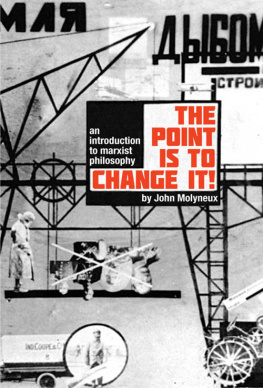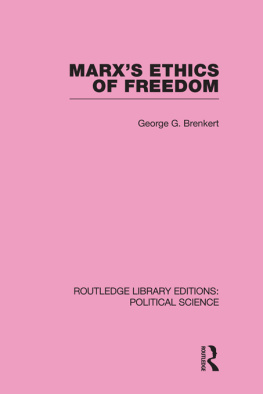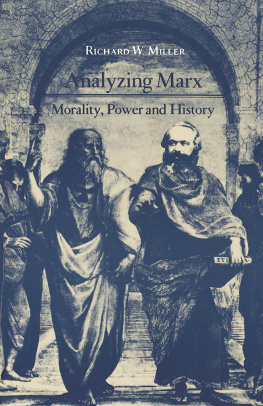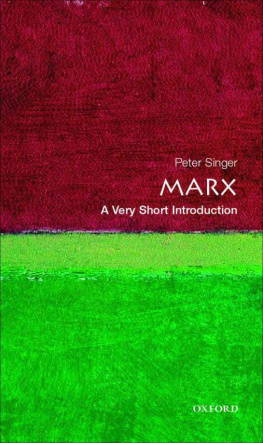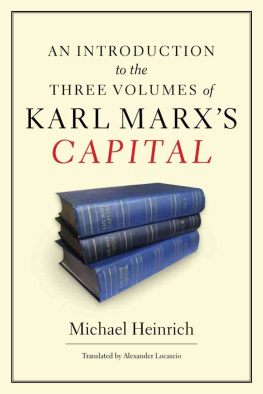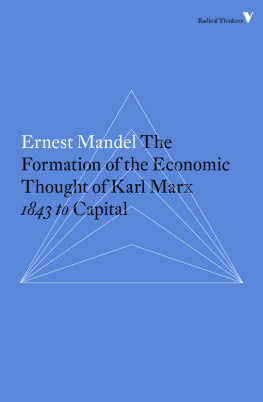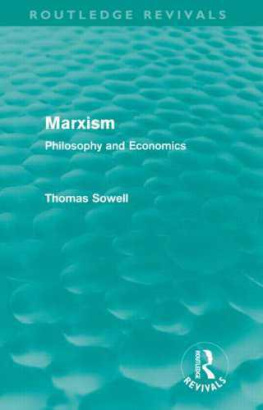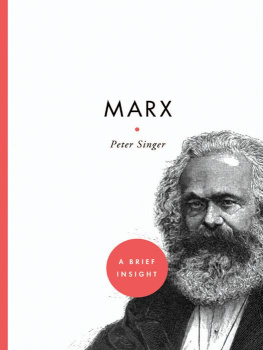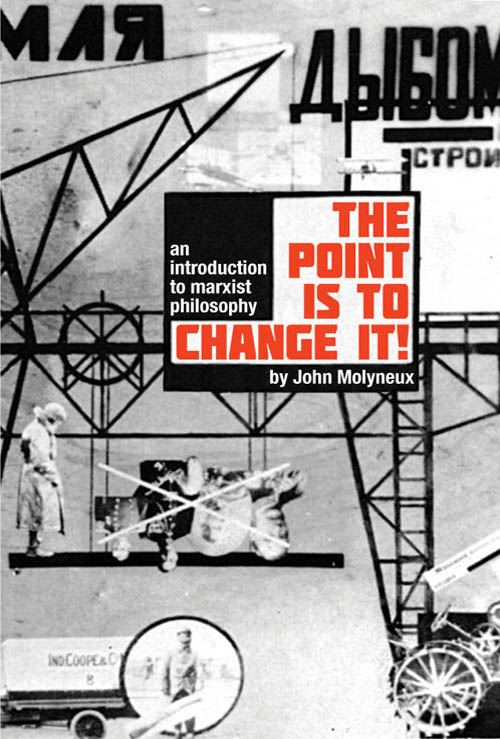The Point is to Change it:
An Introduction to Marxist Philosophy
John Molyneux

The Point is to Change it: An Introduction to Marxist Philosophy John Molyneux
First published in 2012 by Bookmarks Publications
C / O 1 Bloomsbury Street, London WC1B 3QE
Bookmarks Publications
Typeset by Phil Whaite
Printed by Russell Press
ISBN 978 1 909026 01 8
Contents
About the author
John Molyneux is a socialist writer and activist, formerly a lecturer at Portsmouth University and now living in Dublin. His publications include Marxism and the Party (1978), What is the Real Marxist Tradition? (1985), Rembrandt and Revolution (2001), Anarchism: A Marxist Criticism (2011) and Will the Revolution be Televised? A Marxist Analysis of the Media (2011). He is a member of the Socialist Workers Party in Britain and Ireland.
Preface
The title of this small book comes, of course, from Marx. Philosophers have only interpreted the world in various ways the point, however, is to change it, the 11th and last of Marxs Theses on Feuerbach, is inscribed on his grave in Highgate Cemetery, and rightly so. It sums up Marxs philosophy and it sums up the man. As Engels said, speaking at Marxs graveside:
For Marx was before all else a revolutionist. His real mission in life was to contribute, in one way or another, to the overthrow of capitalist society and of the state institutions which it had brought into being, to contribute to the liberation of the modern proletariat, which he was the first to make conscious of its own position and its needs, conscious of the conditions of its emancipation. Fighting was his element. And he fought with a passion. (K Marx and F Engels, Selected Works, Vol 2, Moscow, 1962, p168)
The title also serves my purposes because what distinguishes this book from many of the introductions to Marxism already available is that, while it focuses on philosophy, it is written primarily for activists.
The last couple of years have seen the emergence, internationally, of a whole new generation of activists. From the Tunisian and Egyptian Revolutions and the rest of the Arab Spring to the indignados in Spain, the anti-austerity revolt in Greece, the Occupy movement in the US and many other struggles, big and small, round the world, people are taking to the streets in their millions. If this book reaches only a tiny fraction of those involved in this wave of revolt and is able to increase and clarify their understanding of Marxism, it will have achieved its main aim.
This aim has shaped the writing of this book in several ways. First, the language: I have tried to make the language, in contrast to most books on philosophy, as straightforward as possible. Clearly a work on Marxist philosophy cannot avoid talking about dialectics and economic determinism and the like, which are hardly everyday terms, but where such terms are used they are explained. My hope is that I have not oversimplified Marxist philosophy, but my priority has been accessibility to the reader who is new to the subject.
Second, the focus: I have focused on the way various aspects of Marxist philosophy are relevant to the struggle to change the world, rather than on the numerous debates in Marxist philosophy in the academic world. There is a chapter on Lukcs, Gramsci and Althusser (which, the reader is warned, is unavoidably more difficult than the rest of the book) but I have concentrated on the philosophy of Marx and Engels, with inputs from Lenin and Trotsky and not on Sartre, Adorno, Badiou and other stars of continental philosophy.
Third, the structure: I have included sections on alienation, exploitation and class struggle before moving onto more obviously philosophical areas, because I think a basic grasp of these concepts, which are widely misrepresented and misunderstood, is necessary for an understanding of the philosophy as a whole. Also I have devoted quite a lot of space to issues such as human nature, religion and morality, which do arise frequently in everyday life and in the movement. In general the level of argument tends to be as simple as possible at the beginning of the book and to increase in complexity as it goes along, together with the density of quotations and references. Sometimes the same issue, eg economic determinism, is returned to in more detail. This is in line with the attempt to achieve maximum accessibility.
One further point needs to be made at the outset. Mention Marx or Marxist philosophy and it is still the case that many, or maybe most, people think immediately of the Soviet Union under Stalin or Brezhnev and the other so-called Communist regimes in Eastern Europe, China, Cuba, North Korea, etc. These states are widely thought of as representing Marxism in power, as based on Marxism or as actually existing socialism, and this discredits both Marxism and socialism, because (a) they were undemocratic dictatorships and (b) they were largely rejected by their own people. I would also say that if these states did represent Marxism then many of Marxisms central claims would be refuted. For example it would not be the case that the emancipation of the working class must be the act of the working class itself, nor would it be true that under socialism the state would start to wither away, or that racism or sexism would be overcome, and so on.
For my part I do not accept that any of these regimes (with the exception of the early years of the Russian Revolution) were Marxist or socialist in anything but name rather I regard them as various versions of bureaucratic state capitalism, in which the state, engaged in competitive capital accumulation, exploits the working class. (This analysis of the Soviet Union is most fully developed in Tony Cliffs book State Capitalism in Russia.) This question impacts substantially on the subject matter of this book because the interpretation of Marxist philosophy I offer here is very different from the official version that prevailed in Stalinist Russia. For example, Soviet Marxism regarded the theme of alienation as something of a youthful aberration on Marxs part whereas I regard it as central to Marxism as a whole. Similarly Soviet Marxism held to a much more determinist interpretation of historical materialism than I offer here.
Thanks are due to Joseph Choonara and Paul Blackledge for useful comments on the manuscript, likewise to Grant Houldsworth for both technical assistance and many discussions on dialectics we disagree but they have been helpful. And particular thanks to Sally Campbell at Bookmarks for all her work and assistance.
Finally, I want to dedicate this book to two people: to Mary Smith everyone who knows me or knows Mary will understand why; and to the Marxist writer and activist, Chris Harman everyone who knew Chris will understand that too.
John Molyneux
May 2012
1. Why philosophy matters
It is obvious that you do not have to know much about philosophy to participate in a demonstration, a strike or a revolutionary uprising. And a good job too. If we had to wait for large numbers of working people to read Marx and Hegel, demonstrations, strikes and, most certainly, revolutions would never happen.
However, the struggle for a better world does not consist only of these moments of direct confrontation. In between and during these high points there is a day-to-day battle of ideas, an ideological struggle against the worldview propagated by our rulers, and alongside this there is the day-to-day work of organisation, building and sustaining the union, the campaign or the political party. It is very difficult to sustain much ongoing political work for any length of time without a coherent alternative worldview to the dominant ideology which we encounter every day in the media (and at work, at school, at college, etc). A significant role in an alternative worldview is played by questions of philosophy.

